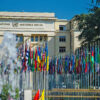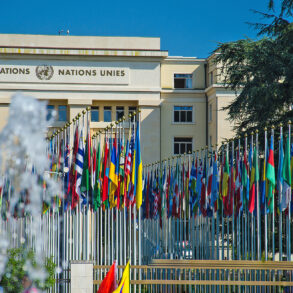Interview with long-standing environmentalist Fazlun Khalid on crisis and hope. He demands that Muslims must face facts.
ISLAMIC TIMES – Fazlun Khalid is a British Islamic scholar and environmental activist. He is considered one of the leading voices in Islamic environmental theology. He founded the Islamic Foundation for Ecology and Environmental Sciences (IFEES) in 1994. It works on environmental education projects worldwide. He advises international organisations such as the United Nations on environmental and religious issues.
Recently, a team of 12 Islamic scholars under his leadership published the groundbreaking document “Al-Mizan. A Promise for the Earth”. It calls on all Muslims to integrate sustainability into their daily lives and to work together to protect our common home.
We talk to him about humanity’s prospects in the environmental crisis, why it is necessary to critically examine the economy in environmental terms, and what role Muslims (must) play in this.
Environment: ‘We are in the middle of a disaster’
Islamic Newspaper: If we look at the current state of the global environment, nature and climate, is it 5 to 12 or 5 past 12 for humanity?
Fazlun Khalid: That’s an interesting question. I think we are in the middle of the disaster. This is just the beginning. We are experiencing this in the climate in terms of heavy rainfall in one place and drought in another. In terms of soil, the demands of agriculture are leading to an ever-increasing use of land. There are no longer enough products for human consumption. And plastic waste has become global. But people don’t realise that it’s already in their bodies.
Jane Goodall, one of the leading environmentalists of the 20th century, once said many years ago: “You know, there are over 200 poisons in your body today that your grandparents never had anything to do with.” We are in the process of destroying ourselves. And despite all the evidence, we are still bound by a system that benefits corporations, banks and consumerism.

Photo: Parsha | Shutterstock
One terrible aspect of this is that people still want more and more. And that has a direct impact on the livelihoods of the poor. The Global North and the islands of wealth in other parts of the world have created a situation in which the Global South suffers. It makes no difference whether you live in a Muslim, Christian or Buddhist country.
This state of crisis cannot last. Even lip service such as the talk of “sustainability,” which is very poorly defined, does not change anything. What should be sustainable? The economy is driving the global village forward. But this is not recognised as a problem.
Islamic Newspaper: We are dealing with multiple problem complexes – climate change, species extinction and plastic waste. Has the Muslim world actually recognised their extent?
Fazlun Khalid: It ignores the problem. In a sense, the “Islamic world” is no different from the rest. We are part of a global system and may call this or that “Islamic.” It must finally recognise that it is driven by the same things as everyone else. This includes the fact that the oil that is extracted there is consumed by the whole world. That means that Muslims depend on the consumption of others.
And what is being done? It is all well and good to have one or two environmental projects, but the global consequences are very negative. We are in what could be called the construction of a lizard. There is a hadith from the Messenger of Allah, may Allah bless him and grant him peace, which says, “There will come a time when you will be like them.” And so much so that Muslims will follow them into the cave of a lizard. When asked who was meant by this, he replied: “Jews and Christians.”
We are in the same boat. This means that we cannot really make a distinction between Muslim and other countries. That has to be our first insight.
If there is a collapse, it will be global. Scientists today assume that the goal of limiting global warming to 1.5 degrees Celsius since the beginning of industrialisation has failed. They now consider 3 degrees to be realistic. Then the world order will be at an end.
As Muslims, we have to find a language that others understand. We hope that our document will help us to do that. We have something unique to offer. Let’s work together. It’s not just ours, we want to share it with you.

Photo: NourEnergy, GreenIftar
How do you scale up local successes to a global level?
Islamic Newspaper: Dear Fazlun Khalid, you have been involved in international campaigns and programmes in various capacities. Were these initiatives successful?
Fazlun Khalid: It was successful in terms of local effects. We tried to take it to a global level, but many people there don’t listen to us. A very successful project was launched in Zanzibar in 1999. There, we were able to dissuade local fishermen from fishing with dynamite in the coral reefs by referring to Qur’anic verses. One of their leaders came to us and thanked us for addressing them at this level.
That was a local success. But can we replicate it worldwide? We have held workshops in Africa, Indonesia and Madagascar. There we trained scholars, imams, teachers, etc. But everywhere we had to fight against the primacy of consumption and development. And that is not easy. Our Quran-based programmes in Indonesia are now taught in thousands of madrasas throughout the archipelago. On this basis, the Indonesian ‘ulama have issued fatwas against climate change, deforestation, the indiscriminate killing of animals, etc.
All these statements will not help us at the national level if they do not become government policy. However, it is possible to apply these legal interpretations to a local situation. And that is what the Muslims there are trying to do.
On the other hand, the government is financing multinational corporations to clear the rainforest to make way for palm oil plantations. And that contradicts every fatwa you can imagine. We are trying to fight against these contradictions and educate people.
Islamic Newspaper: What characterises your work and what has made you a pioneer is that you base your arguments on environmental issues on generally recognised Islamic sources…
Fazlun Khalid: Yes, there is a big difference in the understanding of the relationship between the creation of Allah and man and what can be called the fitra. In a certain context, it can be said that the entire Qur’an is also a document of environmental protection.
Just saying, “Praise be to Allah, Lord of the Worlds,” is an explanation of the relationship between Allah and His creation. Our text, “Al Mizan,” is based on the balance of creation. One verse says that Allah does not love the wasteful. Allah says in the Surah Ar-Rahman, verses 5 and 6: “The sun and the moon run according to calculation. The stemless plants and the trees prostrate themselves.” What does that mean? Why does he speak of the trees? Obviously, they do not prostrate themselves like we do. They worship Allah by serving their purpose of creation, for which they were created. A fully grown tree can bind up to 15 kilos of CO2.
Islamic newspaper: You have written an important document with ‘Al Mizan’. What is it about?
Fazulun Khalid: I hope that our document and the future work will strengthen us in this task. It was written by 12 international scientists, and I had the honour of leading the team. But the time for talking is over, now we have to act! Of course, there are scientists who can deepen their studies. But above all, we have to create facts! Just as the Messenger of Allah created a practice based on the verses of the Qur’an.
Young Muslims are committed to creation
Islamic Newspaper: Let’s get down to practice. For years, there has been a movement among younger Muslims in the West – and independently of countries in the Muslim world – that advocates ecological practice among Muslims. What would be your advice for mosque communities and projects in Europe?
Fazlun Khalid: I am familiar with the texts. New ones have been added in recent years. We exchange ideas with the relevant websites, research institutions and organisations. And we encourage them to continue this work. We also have a growing movement like this in the UK.
The same applies to the USA and other parts of the West. The good thing about initiatives such as GreenIftar and others is that it is not just about avoiding disposable tableware, plastic bottles or SUVs. It is about people understanding what the crucial environmental crisis in their lives is.
But I have the feeling that this is not enough. What we need at the international level, and here the Islamic world must act, is the realisation that our current financial system is at the core of the crisis.
We all have to critically question our lifestyle! People will not change without reason, without a massive crisis point. We need people who act according to the will of Allah and the Qur’an and create a different way of life. Otherwise, the current line of development is clear to everyone.

Photo: Europäische Zentralbank (EZB)/Kiefer | Licence: CC-BY-SA 2.0
Islamic Newspaper: One of the beliefs that transcends religions and cultures is the belief in permanent economic growth and its necessity. Your work has long since focused on the effect of ecology on the ecological crisis. What form does your criticism take?
Fazlun Khalid: We have the advantage of being well versed in both areas. That is to say, we are familiar with Islamic doctrine and the Western paradigm of our current situation. Muslims are strongly connected to and influenced by this economic system. Today, humanity consumes a whole year’s worth of natural resources in just 6–7 months.
We have to ask ourselves when the last time was that there was a balance between the possibilities of the natural world and its population. In this respect, there have been dramatic changes in the 20th century.
We have demanded everything from nature, and now it is in decline. We want growth and more growth. It took humanity 12,000 years to grow from a few million to around 1.6 billion at the beginning of the 20th century. Today, 120 years later, we are over 8 billion.
Islamic Newspaper: Is there anything that gives you hope or does that sound banal to you?
Fazlun Khalid: Not at all, that’s a fundamental question. We have faith in Allah. The Qur’anic paradigm means promoting good and rejecting bad. We have to be careful because the analysis can also make people depressed.
There is a place between optimism and pessimism – realism. We have to face realities and at the same time remain optimistic. This means trusting in Allah, encouraging our children and bringing them the good news.
Islamic Newspaper: Dear Fazlun Khalid, thank you for the interview.











